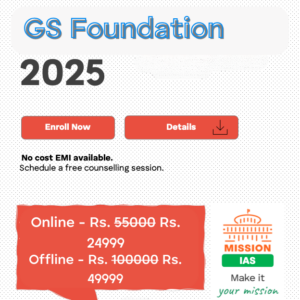
The UPSC Civil Services Examination (CSE) is a test of exam abilities as well as knowledge. It is critical that you develop a strong UPSC Mains strategy that will help you improve your score and increase your chances of achieving a decent rank. Finding an appropriate method for UPSC Mains preparation is the first step. We present to you one such UPSC Mains Strategy in this article, which will undoubtedly help you to maximize your marks in UPSC Mains and assist you in effectively planning your own.
1. Keep track of your time.
Each General Studies Paper of the UPSC Civil Services Examination (CSE) is worth 250 marks. There are normally 20 questions to answer in each paper, though there are exceptions; the time limit is 180 minutes (3 hours). If all questions have the same grade, it will take you about 8-9 minutes to answer each one. Set time aside if the mark varies from question to question.
However, if keeping to a time restriction for each question is difficult for you, make an hourly goal. Make sure you answer 6 questions in the first hour, and 7 questions in the second and third hours. That, too, will suffice!
Make a goal for yourself on a monthly, weekly, and daily basis. Stick to your plan and make sure you meet all of your objectives. Make small, manageable goals for yourself. Don’t abandon the entire plan if your preparation is disturbed for 1-2 days; instead, divide the elements you missed over the week.
Keep two hours each day to reflect on what you’ve read. Make time on weekends to practice answering questions and reviewing what you learned throughout the week.
2. Prepare a structure for your answer.
The structure of your answer should demonstrate to the examiner that you are well-versed in the subject. Make sure it’s a pleasure for him to read your responses rather than a chore. To make your answer stand out, consider what should be included in the introduction, body, and conclusion. In your answer body, make sure to include several facets of the issue topic – social, political, economic, and so on.
The structure of your answer should demonstrate to the examiner that you are well-versed in the subject. Make sure it’s a pleasure for him to read your responses rather than a chore. To make your answer stand out, consider what should be included in the introduction, body, and conclusion. In your answer body, make sure to include several facets of the issue topic – social, political, economic, and so on.
The way you present your answer is quite significant. When possible, use diagrams. It is suggested that you use bullet points in questions when they are acceptable. Use paragraph structure with headings and subheadings for other inquiries. It’s also a good idea to highlight the keywords. The easier you make it for the examiner to read your answer, the more marks you’ll score. Always make an effort to back up your answer with relevant examples. Furthermore, if you can present actual answers to difficulties, you are demonstrating to the examiner that you are a capable officer. Keep this golden guideline in mind at all times.
3. Give Mock Tests on a Regular Basis.
Mock tests are now vital since they provide you with an exam-like experience and train you to write your best answers in a difficult exam circumstances. Consider it an opportunity to learn about the answer-writing process and to compose short, crisp responses in response to the questions’ demands.
Practicing is a crucial part of UPSC preparation. Solving mock papers is the ideal approach to put your skills to the test. They will offer you an idea of what the main papers will be like and will allow you to assess your preparation.
It’s pointless to study for the UPSC Mains if you don’t evaluate your performance. To analyze your scores, you must solve mocks every two weeks or once per weekend. The UPSC Mains is a difficult exam, and you must be well-prepared to succeed.
4. Keep up with current affairs on a daily basis.
Following the newspaper diligently and consistently every day is an important, if not crucial, part of the preparation. All major national and international events should be kept up to date by the candidate. You can subscribe to one or two periodicals and government websites, such as Yojana, Kurukshetra, PIB, PRS, and so on. Additionally, if time allows, you can begin your initial answer writing practice once you have completed the main syllabus. Make an effort to have it evaluated by a senior or an instructor.
One thing to keep in mind is that the mains and prelims syllabuses are not fully segregated. In fact, there is a large overlap. As a result, a considerable percentage of UPSC Prelims is covered when preparing for UPSC mains. From January or February onwards, one can go into ‘prelims-focused’ mode for the remaining period. The golden trinity of ‘revision, consolidation, and assessment’ must now become part of the preparatory process.
5. Staying Focused
The UPSC preparation is a physically and emotionally draining exercise. To reach your objectives, it is critical to maintain a clear mind and a fit body. Your morale and preparation will suffer as a result of the stress. Don’t throw away months of planning. To stay on track while preparing, meditate and exercise on a regular basis.
Don’t stray from your objectives. We are aware of how difficult it is to pass the UPSC examinations. However, if you are smart enough to pass the preliminary exams, proper preparation will almost certainly result in positive results in the mains. Maintain your motivation and dedication to your objectives. This piece of advice will assist you in implementing all of the previous suggestions. Concentrate and have faith that what is meant to be will come to pass.
6. Choosing the optional wisely
Choosing the best UPSC option should be a carefully considered decision. Your score is determined by which option you select. This is your only competitive advantage over other contenders. Before making a decision, it is a good idea to review all of the UPSC optional subjects and curriculum. This will assist you in identifying potential topics for yourself. The Best UPSC Optional Subjects are chosen based on a set of criteria that you must go over at least once in order to make the best decision.
Candidates should take their time and select the suitable option. The optional subjects must be thoroughly researched, and the technique differs from that used in the General Studies Papers. It is a good idea to choose optional subject papers based on your skill and specialization so that you are familiar with them and may cut down on your preparation time. Agriculture, Geography, Zoology, Sociology, Anthropology, Economics, Law, Philosophy, and others are some of the UPSC Mains optional study disciplines. Make sure to pick a subject that you are familiar with since this will make it much easier for you to get good grades.
Apart from the six tips mentioned above, you can use the following elements to get an advantage:
- You should use diagrams, flowcharts, and tables to make your solution appear more intriguing. You can make a short, rudimentary diagram with the same pen you’re using to write the answer. You don’t need to utilize a lot of different colors. Even if the exam is a few days away, it is recommended that you go over a few maps and diagrams every day a week before the exam.
- Highlighting with a colored pen. Make headers or subheadings, write point-by-point/paragraph-by-paragraph, and mark each heading according to your knowledge level. This does not apply if you are unfamiliar with the topic. Make headings and write in paragraphs if this is the case.
- Try to underline essential sentences with the same pen as soon as you finish a response, but be sure you do so. It will take less than 10 seconds, allowing you to earn extra points.
- Keep the language and length of the answer simple; the examiner expects the presentation to be free of grammar problems. Don’t be concerned about the word limit; there’s no need to count the words. Be specific and save time by writing large answers that cover the majority of the available area. If you don’t have enough time, make headings and sub-headings as large as possible by adding a few lines under each heading.
- Incorporating numerical data from sources such as economic surveys and budgets substantiates your answer. Revise them thoroughly so that they can be quoted at any time. A day before your exam, go through some basic numerical data that applies everywhere. Write it and get a few points ahead of your competition.
- Work on making your words, sentences, and paragraphs more spaced out. Make sure there’s enough room in your answer so it doesn’t look crammed.
- Real-life examples make solutions more interesting and significant, and they are genuine observations on developing a solution-based approach to the problem posed in the question.
- The multi-dimensional and multidisciplinary method enriches the responses by giving weight to what the aspirants want to address and meticulously collecting them in the answer. You’ll never run out of reflections in the exam if you do it this way. Try to determine whether to write short-term and long-term proposals while providing a solution and write diligently. You can also write while noting the benefits and drawbacks, and then come to a balanced conclusion.
- If at all possible, include quotations: theme-based questions on social issues, as well as other topics as they arise.
- Schemes and committees: you can discuss the difficulties with older schemes as well as the newer schemes that have just been introduced as part of hopeful solutions.
- Make an attempt to divide the answer structure into three parts: introduction, body, and conclusion. Write in a broad, well-balanced, and diversified style. Always end on a positive note, preferably with a quote if possible.
So, utilizing the 6-step UPSC Mains Preparation plan that we advocate, this is how to prepare for UPSC Mains. Use this as motivation to devise your own exam-cracking approach. The UPSC Mains can be cracked by being organized and selecting the right material for in-depth study. Nobody can stop you if you are committed to obtaining your desired rank or cadre and becoming a prestigious IAS Officer.
Frequently Asked Questions (FAQs)
1. FAQ: What are the key strategies to effectively manage time during UPSC Mains to maximize marks?
Answer: Time management is crucial in UPSC Mains. Allocate specific time to each section, prioritize questions based on your strengths, and stick to the allocated time. Regular practice with timed mock tests can help refine your time management skills.
2. FAQ: How can I enhance my answer writing skills for better scoring in UPSC Mains?
Answer: Focus on clarity, conciseness, and relevance in your answers. Practice writing answers regularly and seek feedback. Analyze model answers and understand the art of presenting information in a structured and coherent manner. Develop a habit of linking concepts and providing well-rounded perspectives.
3. FAQ: Is it necessary to cover the entire syllabus, or should I prioritize specific topics for better marks in UPSC Mains?
Answer: While a broad understanding of the syllabus is essential, prioritize topics based on their relevance and scoring potential. Concentrate on areas where you can demonstrate in-depth knowledge. A strategic approach involves a balanced coverage of the syllabus, focusing more on your strengths.
4. FAQ: How can I effectively use examples and case studies in my answers to fetch more marks in UPSC Mains?
Answer: Incorporating real-life examples and case studies enhances the quality of your answers. Relate theoretical concepts to practical scenarios, historical events, or current affairs. This not only demonstrates a comprehensive understanding but also showcases your ability to apply knowledge in diverse situations.
5. FAQ: How important is revision in the preparation strategy for UPSC Mains, and what is the recommended revision schedule?
Answer: Regular revision is critical for the retention and reinforcement of knowledge. Create a revision schedule that includes daily, weekly, and monthly reviews. Focus on weak areas, and revisit important topics frequently. This ensures that you retain information effectively and can recall it during the exam.
In case you still have your doubts, contact us on 9811333901.
For UPSC Prelims Resources, Click here
For Daily Updates and Study Material:
Join our Telegram Channel – Edukemy for IAS
- 1. Learn through Videos – here
- 2. Be Exam Ready by Practicing Daily MCQs – here
- 3. Daily Newsletter – Get all your Current Affairs Covered – here
- 4. Mains Answer Writing Practice – here


